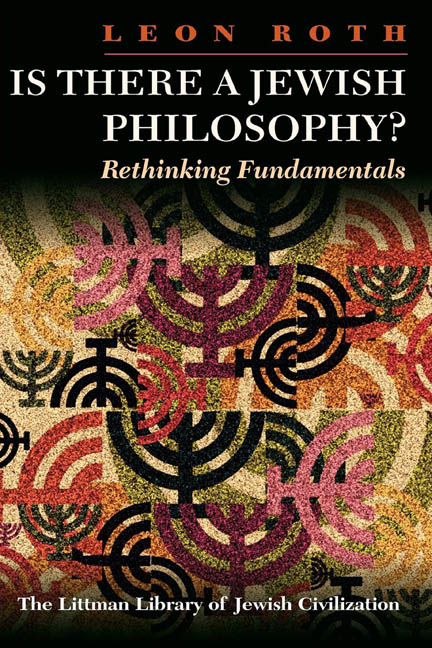Book contents
- Frontmatter
- Dedication
- Contents
- Publisher's Note
- Foreword
- Note
- Is there a Jewish Philosophy?
- Imitatio Dei and the Idea of Holiness
- Jewish Thought as a Factor in Civilization
- The Significance of Biblical Prophecy for Our Time
- Some Reflections on the Interpretation of Scripture
- Baruch Spinoza: His Religious Importance for the Jew of Today
- Judaism: The Elements
- Authority, Religion, and Law
- Moralization and Demoralization in Jewish Ethics
- Mysticism, Thick and Thin
- Back To, Forward From, Ahad Ha'am?
- Maimonides
- Bibliography of the Writings of Leon Roth
- Index
Judaism: The Elements
- Frontmatter
- Dedication
- Contents
- Publisher's Note
- Foreword
- Note
- Is there a Jewish Philosophy?
- Imitatio Dei and the Idea of Holiness
- Jewish Thought as a Factor in Civilization
- The Significance of Biblical Prophecy for Our Time
- Some Reflections on the Interpretation of Scripture
- Baruch Spinoza: His Religious Importance for the Jew of Today
- Judaism: The Elements
- Authority, Religion, and Law
- Moralization and Demoralization in Jewish Ethics
- Mysticism, Thick and Thin
- Back To, Forward From, Ahad Ha'am?
- Maimonides
- Bibliography of the Writings of Leon Roth
- Index
Summary
THERE have been many attempts at a pocket definition of Judaism. There is Hillel's, in reply to a would-be convert's request to be taught Judaism while he stood on one leg: ‘What you do not like yourself, do not do to others. ‘ There is the medieval rabbi's (in the words of the psalmist): 'In all thy ways know God.’ There is the prophet Jonah's: ‘I am a Hebrew and I reverence the God of Heaven who made the sea and the dry land.’ A famous one is that of Micah: ‘He hath told thee, 0 man, what is good; and what doth God require of thee but to do justice and to love mercy and to walk humbly with thy God?’ What is common to all these summary statements is that they are couched in terms of general moral values. Like Micah's pronouncement, they are concerned with no one person or group of persons but with man.
The content of Judaism would thus seem to be universal, yet its bearers are a particular people, the Jews; and the history of Judaism is the story of the balance (often an uneasy one) between the universality of the doctrine and the particularity of its transmitters. The connection between the two is laid down clearly from the very first. God is represented as having 'known’ Abraham (that is, singled him out from all others) in order that he should command his children and his household after him to practise the ‘way of God, that is, to do justice and judgment’. Here, too, the terms used are completely general: justice, judgement, the way of God; and the children of Abraham are to be the vehicle through which the way of God (that is, the way of justice and judgement) is to be displayed.
This is the doctrine of the ‘chosen people', a doctrine which has been misunderstood by both Jews and non-Jews, and which has done much harm. It is so easy to claim to be the chosen people, and to forget that the choice means duty, not privilege. In itself no one people is any better, as in itself no one people is any worse, than any other.
- Type
- Chapter
- Information
- Is There a Jewish Philosophy?Rethinking Fundamentals, pp. 108 - 120Publisher: Liverpool University PressPrint publication year: 1999



